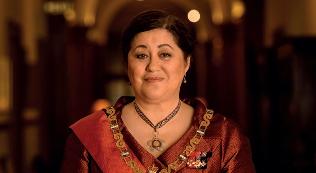


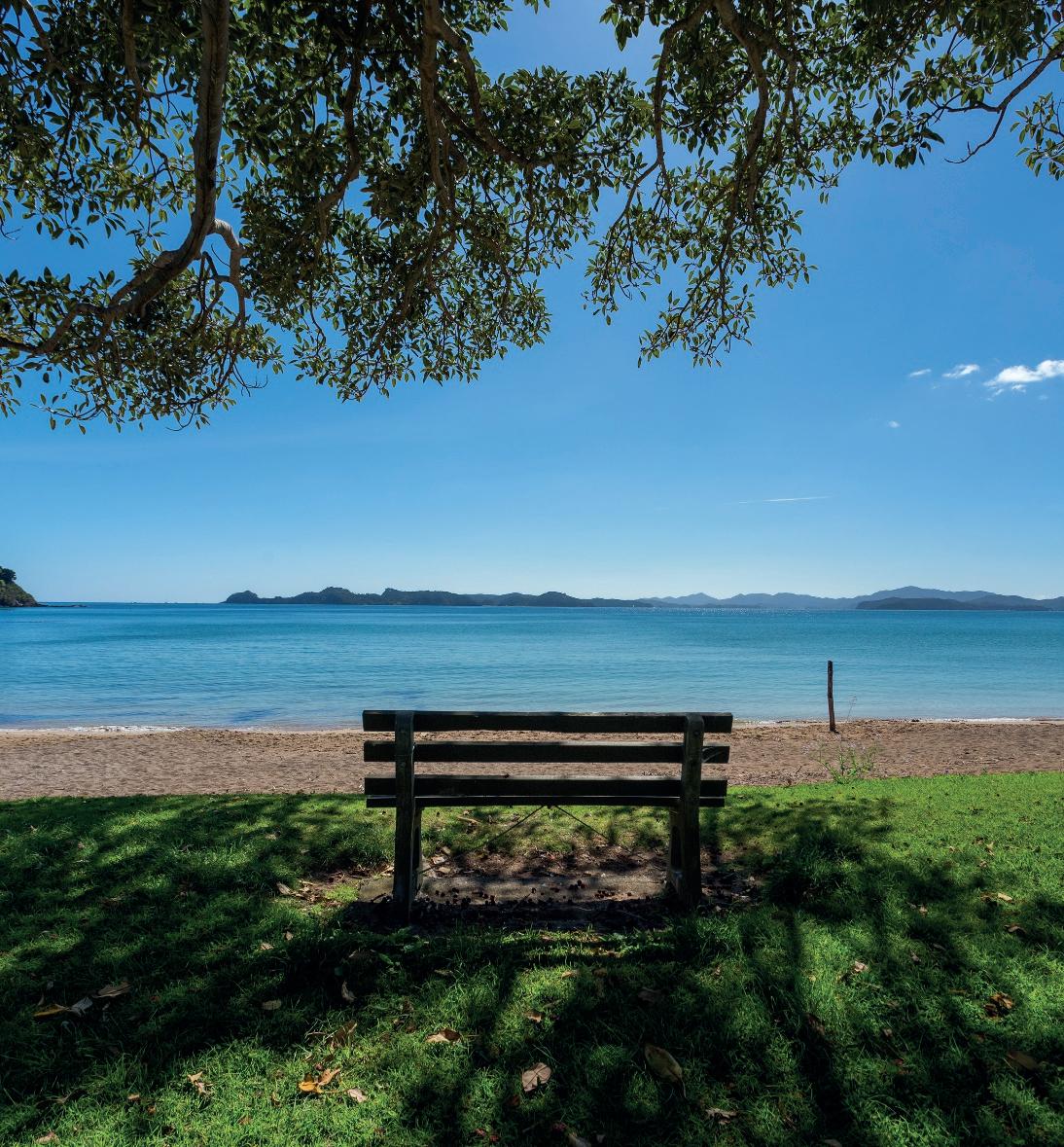
NEWS www.veteransaffairs.mil.nz
SUMMER 2021
VA News
16 Dame Cindy Kiro, Governor-General of New Zealand
4 Danny Nelson, RNZRSA
Take some time for your wellbeing
7 Kelly Blyth and Ranfurly Veterans’ Trust
3 Afghanistan: Looking after your wellbeing
4 Danny Nelson, RNZRSA
5 Messages from the Minister and Chief of Defence Force
6 Making a plan for our veterans
7 Kelly Blyth, Ranfurly Veterans’ Trust
9 More veterans qualify for NZOSM
11 SGT Henry Nicholas VC, MM
12 Age Concern New Zealand
14 Year in review
16 Message from the Governor-General
About VA News
VA News is published four times a year by Veterans’ Affairs New Zealand— Te Tira Ahu Ika a Whiro. Our team takes care in writing great content and—to the best of our knowledge—has sourced accurate information.
The views expressed in VA News are not necessarily those of Veterans’ Affairs or the New Zealand Defence Force.
Contact us
For more information about Veterans’ Affairs or anything in this edition of VA News:
www.veteransaffairs.mil.nz
veterans@nzdf.mil.nz
0800 483 8372 (Freephone New Zealand)
1800 483 837 (Freephone Australia)
+64 4 495 2070 (rest of world)
Veterans’ Affairs PO Box 5146
Wellington 6140 New Zealand
From the Head of Veterans’ Affairs
Tēnā koutou katoa
Welcome to the summer edition of VA News
With Christmas fast approaching, it brings us almost to the end of what has been a very difficult year for many. The COVID-19 global pandemic has seen us separated from our friends, loved ones and each other. We’ve had to learn to navigate slightly different alert levels and lockdowns and I know that for our veterans in Auckland, including their friends, families and whānau, it has been particularly tough. Amongst these COVID-19 moments there have been occasions of joy, sadness and remembrance. We welcomed 26 of our Jayforce veterans and family members to Wellington back in March. This was the first time since the arrival of Jayforce in Japan in 1946, that their service had been honoured and celebrated at a national commemoration. The weather was spectacular as old comrades came together, many having not seen each other in decades.
We also lost our oldest veteran, Ron Hermanns, just three weeks shy of his 110th birthday. Ron served in the Second World War with the Royal New Zealand Air Force with overseas postings to the Pacific, first to Espiritu Santo in 1943, and then to Guadalcanal in 1945. Ron holds a special place in the hearts of all those who met him.
We conducted a number of other activities throughout the year and further on in VA News we have included a round-up of those events together with some great images. Please make sure you check these out. We also have a lovely message from our New Governor-General Her Excellency The Rt Hon Dame Cindy Kiro. This edition also focuses on wellbeing and with Christmas almost here, we want to make sure that you take time for your own personal wellbeing.
Bernadine Mackenzie, Head of Veterans’ Affairs
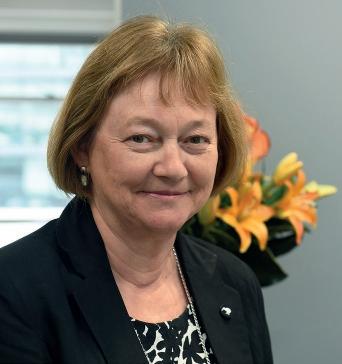
We’ve included some tips on staying well and healthy and we’re also sharing stories from a couple of our Afghanistan veterans in terms of how they stay connected with each other to help maintain overall wellbeing. In closing, I want to acknowledge the sudden passing of one of the VA team back in October. Andrew Fruean was a much loved and respected case manager and member of our Veterans’ Affairs family. Andrew had been with Veterans’ Affairs for 14 years during which time he had accompanied veterans overseas to South Korea and Italy, as well as meeting many others at our veterans’ forums. He will be remembered as a man with a big heart, a musically talented singer/ songwriter and someone who always did his best for our veterans and their families. Together with his family we will miss him greatly, as will the many veterans he came to know. May he Rest in Peace.
My staff and I look forward to serving you again in 2022. Meri Kirihimete ki a koe me te whānau, we wish you and your loved ones a safe and happy Christmas season.
Bernadine
Veterans’ Affairs Christmas and New Year hours
We’ll be closed over the Christmas and New Year period, closing midday on Thursday 23 December and reopen on Wednesday 5 January. We wish you and your whānau a safe and happy festive period.
2
In this issue
Afghanistan: Looking after your wellbeing
New Zealand Defence Force personnel withdrew from Afghanistan earlier this year, and the deployment has now concluded. However, that deployment and the fall of Afghanistan has evoked feelings that will remain with our veterans for some time.
It has been a difficult year for all of us, but for our veterans of the Afghanistan deployment there will be ongoing reminders of their service there, of the people that they met and who remain there, and colleagues that they lost on deployment.
If you are an Afghanistan veteran, we would like to encourage you to think about your wellbeing and if you can, take some steps to maintain it, and if required it is OK to seek support.
These steps can be quite simple and straightforward. We asked some of our Afghanistan veterans what things that they do for their personal wellbeing.
Joe Rae was in Afghanistan in 2012, as the Command Post Signaller, based mostly at COP Romero, and when he saw a television report showing a Taliban flag being raised on the Government building,
“It was fairly destroying seeing Bamiyan, in particular, fall. It makes you feel like the work and effort that went in was all in vain. I suppose at least they had peace for a number of years, so it does count toward something.”
Maintaining his wellbeing is important for Joe.
“A key step for me is chatting to my mates. They’re the ones that have been there too, they understand
and you can vent your feelings and frustrations. A psychologist that I once saw told me the more you speak about the experiences, the more it can help. Each time it’s recounted it strips a little piece of emotion off it, slowly healing you over time.”
Charles (Chaz) Dewes was in Afghanistan in 2003 (Kabul) and then again in 2008 (Bamiyan). He was very clear about what he was doing there.
“For a cause… to provide stability, peace and to rebuild. To support the survivability of a nation, its people and their culture. To create a better life, a safe place.”
When he returned in 2008, he saw dramatic progress within the country. New infrastructure, more confident people and an awakening culture.
“We witnessed our success in the land and its people. Our aim was now a reality but in achieving this aim, in this land, we lost friends.
“After 20 years of operations in Afghanistan, was it worth it? I believe in what we did, our aim and the endstate, the reconstruction of a nation and its people. We did what was needed to be done and the sacrifices that were made were not in vain.
“To the men and women who I was fortunate to serve alongside, you were awesome, be proud of what we achieved and don’t ever think less or let anyone say otherwise.
“Ko mātou ā koutou, mō-rehu-rehu e, whai ake nei, I tae koutou, ki te mura o te ahi. He kō-hatu-hatu, repo-repo, kirikiri e… paru-paru, nga-here, tomo-taua e. Mau-mahara tonu tātou, ki a rātou, mau-mahara tonu tātou, ki a rātou.”
Chaz believes in Te Whare Tapa Whā, “I try to ensure all my sides are equal, balanced, in harmony with each other. If one side is affected, I address it. Being in touch with my Te Ao Māori beliefs has helped a lot. It has kept me grounded, especially between the worlds of Tū and Rongo, and Te Whare Tapa Whā.
Te Taha Wairua. Te Taha Hinengaro. Te Taha Tinana. Te Taha Whānau. “Beat the taniwha while it is still young. Get on top of it – patua te taniwha koi kūao.”
Wayne Higginson was in Afghanistan between 2003 and 2004, part of Op Rua 1, part of the US JTF 180 based in Kabul, and he also feels that the Kiwis over there should be proud of their time there.
“We did all that we could in Afghanistan. It is the long game. We did our best, but like all Kiwis would do, I’m thinking about the people still there.”
Did he have a way to look after himself?
“Talk it over with mates. The people that you were there with. You don’t need an excuse for a catch-up, but this is as good a time as ever.”
Wayne Nepia feels similarly to Wayne Higginson – “My feeling is of disappointment and sadness for our Afghani comrades. As a soldier we do what is asked of us and move on, but for the Afghan people this was years of change, hope, opportunities and building their own country, that was sadly taken away from them.”
Wayne aims for a good balance of work, family and lifestyle. “Stay connected with people who matter. Lifestyle – wellbeing is all about eating right and staying physically fit.”
Taking care of your wellbeing is important and asking for support is OK. For more wellbeing tips have a look at www.va.mil.nz/mentalwellbeing and for more support you can txt 1737 to begin a conversation with a counsellor.
Other support can be provided by:
• Veterans’ Affairs 0800 483 8372
• NZDF4U 0800 693 348
• Lifeline Aotearoa 0800 543 354
• Samaritans 0800 726 666
• Contact RSA’s District Support Managers.
3 visit us online www.veteransaffairs.mil.nz NEWS
Personal Profile:
D anny Nelson Support Services Manager

– RNZRSA
Then I found out that I was the only one accepted for it. The idea of a career in the NZDF didn’t take hold immediately and it took a while before I felt an actual passion for it.
This may have been because of my naivety in selecting the infantry as my corps of choice, especially during basic when realising I actually had to dig holes in the ground to live in. However, I persevered becoming an adequate infantryman and after five years, I had my first deployment overseas to Bosnia, a country where I learned at the tender age of 22 how people can be so different from what I grew up with in New Zealand.
Bosnia opened my eyes up to ethnic conflicts and also to the strain of peacekeeping operations, where you’ve got certain rules to follow in how you try to keep two sides apart to establish peace and reconciliation, and there was no guarantee of success. Coming back from Bosnia it hit me that despite all I the difficulties and tragedy that I’d seen and all that I had done over there, for my fellow New Zealanders their life went on as normal with barely a blip. For me it took me a while to adjust back to the routine of mundane life, despite being in anything but a mundane job.
Having lived the dream of an infantry deployment overseas I decided to have a crack at a role within Intelligence, where 2/1 battalion
had just established company level Intelligence operators. This was my dream job with a mix of infantry field dynamics and cerebral intelligence work. I enjoyed knowing what was going on at every level, retaining the camaraderie I found in the infantry with the variety of intelligence work. In short, I had found my niche. Not soon after I changed corps to intelligence and over the next seven years got posted to different units and deployed to East Timor and Afghanistan in intelligence roles.
After 12 years in the NZDF, I felt that it was time to leave. So in 2003 I bid farewell and transitioned out of the military. This transition was fairly smooth because of two things. Firstly, I had started my mental journey to transition out of the military back in 2001 (after my deployment to East Timor). This allowed me to get used to the idea and to make sure that this was indeed the right thing to do. Secondly, I had a plan. Even though I liked my intelligence work, I had out-grown the NZDF organisation and wanted new challenges, so I thought, “How do I do intelligence work as a civilian employee in a government strategic role?” Answer: get an academic qualification. So off to university I went with my superannuation payment in hand. As with all things in life the easy ride of transition hit a few speed bumps. I found the university life a challenge to my sense of order and professionalism. I found numerous examples of students and staff who were not exactly dedicated to giving their best performance in the academic arena, and this irked me. I also missed the regular income and benefits of military life both tangible and intangible. Luckily for me I soon had another job, this time with the Police.
The quasi paramilitary culture of the Police was a comfortable fit for me. Here, despite being a non-sworn member or in modern parlance a Police employee, I enjoyed the camaraderie of the uniform police staff where my military background was an asset. I was part of the Organised Crime Group (OCU) and enjoyed the pace and work, where the purpose and goal of the unit was very clear. It was there I realised just how much being in the NZDF had given me in terms of hard and soft skills. I could brief and ‘deploy’ with the unit to a drugs warrant, comfortably make safe firearms found, and find things of court and intelligence value. But my soft skills of leadership, initiative and work ethic were also valued and used as well. Though my roles changed as time went on in the Police, from analyst to supervisor and manager, I found that my military background stood me in good stead wherever and whatever I needed it.
Why the long-winded speech about my military service and the time after it? As overseas research has shown, good transition from the military leads to better all-round health and wellbeing for our ex-service people, and that is at the core of what I want for all our veterans. As part of my current role as the Support Service Manager for the RNZRSA I attend transition courses for NZDF personnel to let them know we are there to help, but more importantly I try to pass on nuggets of information to avoid poor transition from the military service. While RSA Support Services focuses on the needs of the service person, I would sooner have ex-service people and their family healthy and well on their own terms without the need for our help and good transition is fundamental to this.
4 OUR PEOPLE
It wasn’t an auspicious start to my military career. It began when I went truant with some mates from high school to sign up for the Army in 1991 as Regular Force cadets.
Message from the Minister
Kia ora
Like me, you’ll probably be looking forward to summer after what’s been a long and tough year – following another long and tough year in 2020. Over the past months, I’ve seen how Kiwi veterans are coping and helping each other cope with lockdowns and restrictions. Sticking by your mates, doing things for your mates – that’s what our people do well. So to all those who’ve helped out by delivering food parcels, making phone calls, visiting where it’s possible, getting vaccinated and encouraging others to as well – a big thanks. And thanks also to the awesome whānau out there. For me, the restrictions we have to live with at the moment make the chances I have to meet up with veterans and talk to them especially precious. A highlight for me this year was spending time with more than 20 Jayforce veterans and their families in Wellington when the 75th anniversary
of Jayforce was marked in March. It was an honour to have a meal and a chat with those who were able to come along. And at the other end of the year, in late October, I attended another moving event in Christchurch. This was a rededication of the grave of a First World War veteran, Henry Nicholas VC MM. Thanks to a lot of work started by an individual veteran, and completed by the RSA and the Remembrance Army, the grave which was damaged in the Christchurch earthquake has now been restored, and is a fitting memorial to a heroic fighter. This project was a wonderful example of veterans helping veterans,
A message from Chief of Defence Force
Mere Kirihimete, Merry Christmas
Wishing you all the very best this Christmas after what has been another eventful year for the country and for the New Zealand Defence Force. COVID-19 has continued to challenge New Zealand, and us all. The various alert levels have, unfortunately, continued to affect a number of planned anniversary commemorations – which was disappointing, particularly as these allow the opportunity to reconnect with comrades and also remind others of the sacrifices our service people have, and continue, to make.
From an operational perspective, NZDF has continued to maintain our support to the all-of-Government response to protecting the borders through Operation PROTECT.
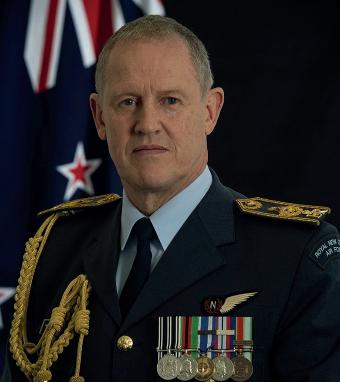
Concurrently the NZDF has responded to many calls to assist both here at home, in New Zealand, and afar.
Operation KŌKAKO was the Defence Force’s non-combat evacuation of personnel from Afghanistan which occurred during the nationwide lockdown in August this year. This, I am sure, would have been close to many veterans’ hearts. Along with Veterans’ Affairs, I am mindful about how this might affect those who served there. We have many forms of support available should you wish to contact us.
Just as you did, our serving personnel continue to make a positive difference in communities both at home and around the world, and I am proud of their service and commitment. I trust that you have all felt supported by Veterans’ Affairs throughout this
and helping to make sure that service is recognised and celebrated. That’s also my mission as your Minister. Those who are prepared to put themselves on their line for country and whānau deserve our recognition and our thanks, and in the coming year I’ll be doing whatever I can to make sure that this happens. I wish all of you and those you love a happy and safe Kirihimete and New Year.
Hon Meka Whaitiri Minister for Veterans
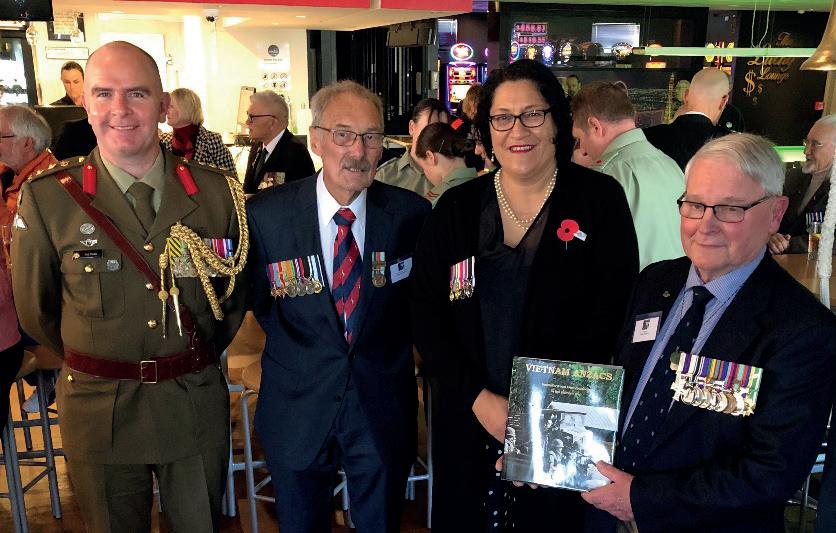
past year in spite of COVID-19 and I know we are all looking forward to the opportunity to see our family and friends at Christmas and over the summer.
I wish you and your whānau a safe and restful Christmas break and all the very best for the New Year.
Ko tātou hei Mana mō Aotearoa –We are A Force for New Zealand Air Marshal Kevin Short
5 visit us online www.veteransaffairs.mil.nz
OUR PEOPLE
Making a plan for our veterans
The Veterans’ Affairs Rehabilitation Team are all qualified health professionals who work with the Case Management team to support veterans with complex needs including those receiving compensation.
Together with the veteran they develop a rehabilitation plan unique to that veteran.
Veterans’ Affairs rehabilitation strategy and application of the Te Whare Tapa Wha model of health means all parts of a veteran’s life are considered,
Te Taha Wairua
Te Taha Hinengaro
Te Taha Tinana
Te Taha Whānau.
Te Whare Tapa Wha means when developing this plan the Case Manager and Rehabilitation Advisor take a broad view of a veteran’s life – their physical, spiritual, emotional, vocational and mental needs. They also consider the veteran’s whānau and see if they require support.
The goals of the plan are set by the veteran and they may have a range of goals. They could include the desire to live independently in their own home, to retrain or return to work.
Team Leader, Rebekah Kooge believes that this wider view of a veteran’s life and his or her goals, often leads to better outcomes for the veteran.

“Sometimes a treatment option even one that is successful doesn’t quite make the positive change that the veteran was expecting. Perhaps in that case the measure of success might have been too narrow or the initial problems a bit broader.
“If we look at all the influences and a wider view of a veteran’s life, we may be able to bring in a number of support services to help that veteran reach their goal.”
The Rehabilitation Team also consider social rehabilitation requests. A team member might refer a veteran to an Occupational Therapist, Physiotherapist or Social Worker to assess how that veteran is at home. One outcome might be to provide support for modifications to their home like installing a ramp, a rail, and other equipment to make it easier for the veteran in their home.
One example is Veterans’ Affairs supported a vocational assessment for a veteran to see if other work options were available, and compatible with his injury. Following that assessment Veterans’ Affairs then supported training courses for him to make a career change.
A significant part of the team’s work is to support Case Managers in reviewing various medical reports and requests for treatment. Treatment options vary greatly and can range from surgery to hearing aids.
This small team works hard for veterans, always ensuring that the veteran’s programme is working for them and is applying the rehabilitation strategy. Rebekah finds it rewarding.
“It’s a real privilege to support our veterans, acknowledge their service, their commitment and sometimes their sacrifice that they made for Aotearoa. I do hope that what we do makes a real difference to veterans and their whānau”.
6 OUR WORK
“If we look at all the influences and a wider view of a veteran’s life, we may be able to bring in a number of support services to help that veteran reach their goal.”
– Rebekah Kooge Team Leader
Kelly Blyt h
Chief Executive, Ranfurly Veterans’ Trust
industry for many years, firstly as a registered nurse and then latterly as national service delivery manager for a large healthcare provider. She found the prospect of using her experience and skills for veterans at the Trust exciting and that caring for people was core to who she is.
“It gives me great pleasure to be able to do this every day at Ranfurly.”
The Ranfurly Veterans’ Trust works closely with Veterans’ Affairs and in addition to the collaboration on the veterans’ forums, they host monthly Veterans’ Affairs case management clinics. Unfortunately, COVID-19 has postponed these clinics for the remainder of this year.
She has been a key partner for Veterans’ Affairs at the many veterans’ forums and expos in recent times. Kelly provides a key coordination and event management role which has been the backbone of the events’ successes.
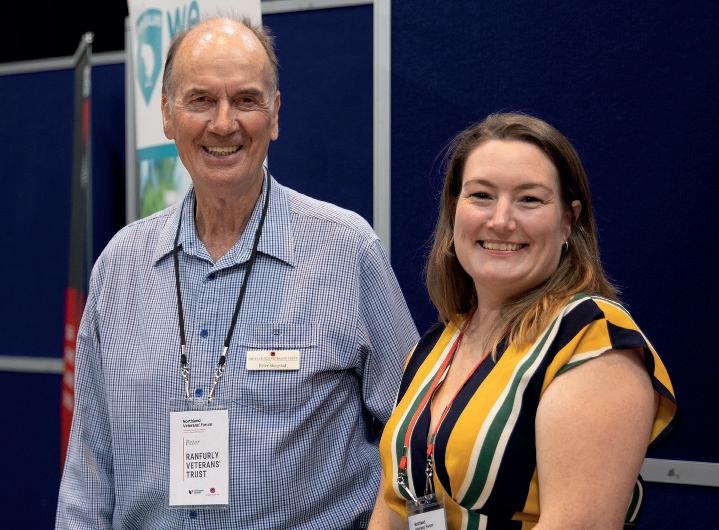
Before joining Ranfurly Veterans’ Trust, Kelly had been in the health
Kelly has been at the Ranfurly Veterans’ Trust since 2018, however the Ranfurly Home is over 100 years old (article next page) and the Trust has recently completed a significant redevelopment.
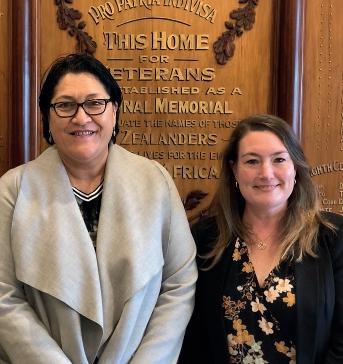
“I felt privileged to be a part of this new journey with the Trust. The purpose-built 60-bed Hospital and renovated Ranfurly House gives us the ability to support and respond to the changing needs of veterans and their whānau.”
COVID-19 has been challenging for veterans, their families and their support organisations, but quick to adapt the energetic Blyth collaborates with other agencies to find ways to support veterans. Together with Auckland-based RSAs and The Poppy Foundation Trust, Ranfurly Veterans’ Trust was able to distribute $135,000 in support this year ($295,000 in three years) to Auckland veterans. Kelly continues to build on her partnership with the RNZRSA. “We worked with the Auckland District RSA and RNZRSA to establish the first full time District Support Manager in Auckland. We want to be able to assist more veterans and setup and manage a volunteer support network.”
There’s no doubting Kelly’s energy and passion, but she showed her tenacious side by being able to open a dedicated respite bed for veterans during lockdown. Kelly is particularly proud of this initiative.
“I have seen the need for this firsthand. Lovely, caring people who are looking after their much-loved veteran all day and all night and now we can give them a well-earned break.”
Kelly Blyth, Chief Executive of the Ranfurly Veterans’ Trust and passionate supporter of veterans. Thank you, Kelly.
7 visit us online www.veteransaffairs.mil.nz OUR PEOPLE
Pictured left: Peter Skogstad, Ranfurly Veterans’ Trust Trustee, and Kelly Blyth, Chief Executive, Ranfurly Veterans’ Trust.
The energetic and passionate Kelly Blyth is well-known to many veterans. As Chief Executive of the Ranfurly Veterans’ Trust, Kelly is a handson and collaborative executive tirelessly supporting veterans.
Ranfurly Veterans’ Trust

Opening a year later it has been in continuous use ever since. It has served veterans of the South African War, World War I and II, Jayforce veterans, and those of the Korean, Malaya, Borneo and Vietnam conflicts.
In 1950 the Ranfurly Home was acquired by the New Zealand Patriotic and Canteen Funds Board who expanded the Ranfurly’s capacity to an 83-bed rest home, a 35-bed hospital and a 24-bed dementia unit, and employed over 100 staff.
In 2002 ownership was returned the Ranfurly Trust. However, the requirement for residential care was declining, and the accommodation built in the 1950s and 60s required extensive refurbishment.
To fund redevelopment the Trust entered a joint venture with retirement village operator, Generus Living Group to redevelop the site. Together they built a 60-bed Hospital, refurbished Ranfurly House (the original Home) and developed a retirement village of 192 apartments.
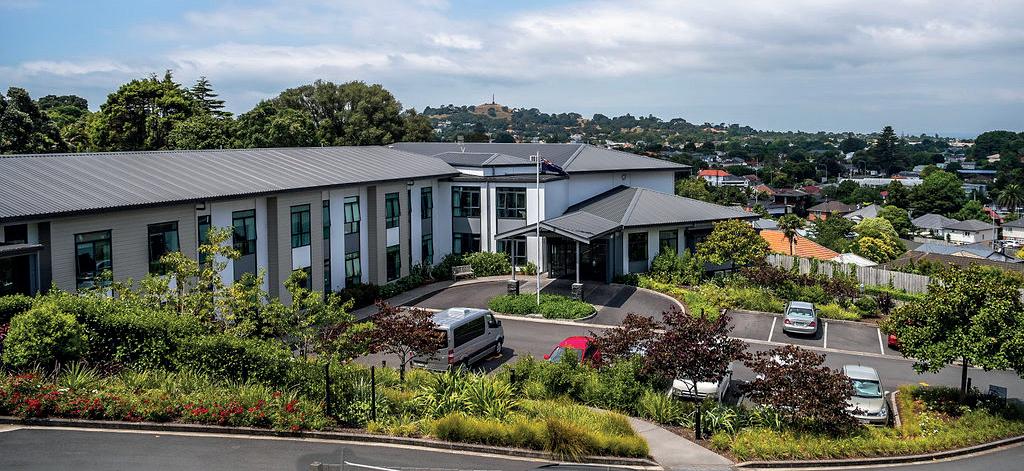

Kelly Blyth (the current CE of Ranfurly Veterans’ Trust) believes that the Trust’s bold moves are already paying off for veterans, their vision of a veteran centre offering multiple services and support for veterans is taking shape.
“The leadership of Chair David McGregor, the previous CEO Graeme McKay and the board have built Ranfurly’s capacity and ability to help veterans now and well into the future.”
For your health and wellbeing and for that of your whānau and community, and as a service to your country, Veterans’ Affairs encourages you to get the COVID-19 vaccination. You can find out more about the COVID-19 vaccination here: https://covid19.govt.nz/covid19-vaccines/
8 NOTICES
At the end of the Boer War, 1902, the 13th Governor of New Zealand, Lord Ranfurly suggested that a Veterans’ home be established and it would be both a “living monument” honouring those who had fallen and it would provide support for veterans.
NEWS
More South East Asia veterans 1959–1974 qualify
for a medal
Eligibility for the New Zealand Operational Service Medal (NZOSM) has been extended to include a larger proportion of members of the New Zealand Armed Forces who served in Malaysia and Singapore.

“The award of this medal recognises the valuable contribution to the defence of South East Asia by veterans who served in Malaysia and Singapore, but were not required to deploy into combat theatres, such as Borneo or Vietnam,” Minister of Defence Peeni Henare said.
“About 4,500 veterans who served in South East Asia from February 1959 to January 1974 are now able to be awarded a medal and I hope the veterans and their whānau take this opportunity to have their service recognised in this way.”
The recent review by the New Zealand Defence Force showed there was a need for a wider approach to medallic recognition for South East Asia than had been the practice in the past.
This was a unique period in New Zealand’s military history which combined: forward deployment and deterrence; operational readiness as part of the South East Asia Treaty Organisation plans for responding to
Armistice Day
November 11th this year marked the 103rd anniversary of the signing of the Armistice between the Allies and Germany in 1918. The Great War of 1914 to 1918 was one of the most devastating events in human history. New Zealand, with a population of 1.1 million in 1914, sent 100,000 men and women abroad, 16,700 died and over 40,000 were wounded. The coming of peace on the 11th hour of the 11th day of the 11th month brought relief for all involved. The First World War had finally ended.
the threat of communist expansion into South East Asia; an ongoing communist terrorist insurgency in Malaysia; the Cold War; a fraught relationship with Indonesia which resulted in conflict; and war in Vietnam. While together these factors justify the award of medallic recognition, they do not justify a campaign medal being awarded. An eligible veteran must have been posted or attached for seven or more days with the Far East Strategic Reserve, the Australia New Zealand United Kingdom Force or associated units during these dates.
Veterans and next-of-kin of deceased veterans need to apply to receive the NZOSM. The application form is
on the New Zealand Defence Force Personnel Archives and Medals website: www.nzdf.mil.nz/pam
About 7,000 veterans of South East Asia combat theatres are already eligible for the NZOSM. Any unclaimed medals can still be issued.
If you wish to apply for the NZOSM please make application via the NZDF website, https://nzdf.mil.nz/nzdf/ medal-and-service-records/medalapplications/.
The award of medals does not give Qualifying Operational Service (QOS) eligibility under the Veterans’ Support Act 2014 or the Burial and Cremation Act 1964. Coverage under the Veterans’ Support Act 2014 is determined by a veteran having qualifying service specified under that Act. All service before 1 April 1974 is covered.
If you served in South East Asia with the Royal New Zealand Navy or the Royal New Zealand Air Force during the entire period under the expanded criteria for the NZOSM, or in the New Zealand Army from 1967 to 1974 but did not serve in Vietnam or have previous service in the Malayan Emergency, on the Thai-Malay border or in the Indonesian Confrontation, you have Qualifying Routine Service and you can receive support from us. This support does not include the Veteran’s Pension, commemorative funding or burial in a service cemetery.
The end of the First World War was cause for much celebration but this was tempered with the depth and spread of the influenza pandemic. New Zealand’s official peace celebrations weren’t held until July 1919.
The signing of the Armistice is observed annually in New Zealand at 11am on 11 November. Two minutes’ silence is observed in memory of those New Zealanders who died while serving their country.
Due to the current COVID-19 global pandemic, commemorations this year were somewhat muted, just as they were for the Armistice in 1918. An Act of Remembrance for Armistice Day was held at the Tomb of the Unknown Warrior at Pukeahu National War Memorial Park in the presence of Her Excellency The Rt Hon Dame Cindy Kiro, GNZM, QSO, Governor-General of New Zealand. The Government was represented by Hon Meka Whaitiri, Minister for Veterans.
9 visit us online www.veteransaffairs.mil.nz
NEWS
The end of the Afghanistan deployment
For the past 20 years, the New Zealand Defence Force worked alongside partners in Afghanistan and made a significant contribution to the lives of the people of Afghanistan.
Now, the final New Zealand forces have withdrawn from the area. That means that we have added a closeoff date for the most recent period of service in Afghanistan.
This latest deployment now covers service in Afghanistan from 1 December 2001 to 30 September 2021.
Previous deployments include:
• service in Afghanistan from 25 April 1988 to 31 December 1991
• service in Afghanistan as part of Operation Teal from 1 August 2004 to 28 February 2005 (superseded with the new declaration).
If you have service in Afghanistan during any of these periods you will have Qualifying Operational Service, and may be eligible for support. Get in touch with us to see what might be available for you now, or in the future.
Behind the scenes
100 years of Rannerdale Village
November marks the centenary of Rannerdale Village providing care to the veteran community. Founded in 1921, Christchurch, Rannerdale is a not-for-profit organisation that supports veterans (and their dependents) from both military and civilian emergency services.
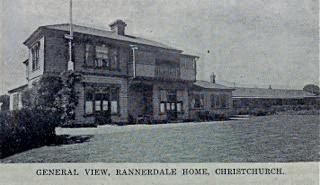
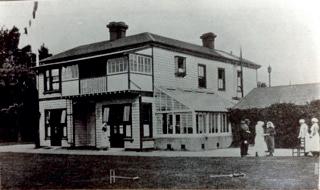
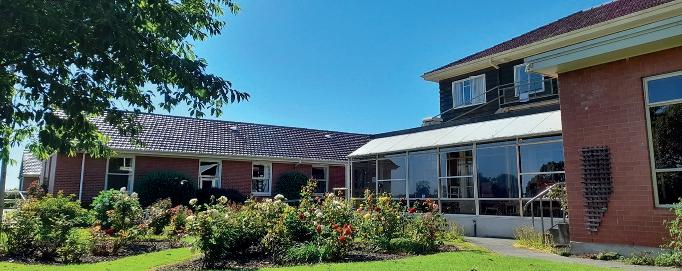
Sarah Van Vianen, Nurse Manager, is proud of Rannerdale’s history and to be looking after veterans.
“It’s an amazing place full of history, comradeship stories and life. We have some lovely interesting people here. Full of stories and life. I’m thrilled that we can look after and support the people who have served their community and country.”
Their goal is to make the veteran’s lifestyle at Rannerdale as similar as they can to the one that their residents would’ve enjoyed if they lived in their own home. Rannerdale has opened their rooms upstairs for those veterans who don’t need Rest home or Hospital care but were looking for boarding options.
“We want to reach more and help more veterans. The ethos of Rannerdale Village is about caring
for veterans no matter what stage of their journey they are on from facility care to home care this is what our homecare services are about.
“We are always looking for opportunities to support our wonderful veteran community and never stop welcoming you and your whānau with open arms.”
Now and for the last 100 years Rannderdale staff have dedicated themselves to veterans and to giving them a home away from home.
www.rannerdale.co.nz
This includes, what they can expect from us if they live outside New Zealand, their rights, how we calculate whole person impairment, how we make decisions and finally, what to do if they disagree with a decision.
This series of videos is still to be completed, but we couldn’t go past a ‘behind the scenes’ look at how it all comes together. We’re fortunate to have veterans in the Veterans’ Affairs team so we couldn’t resist putting one in front of the camera, along with one of our case managers. Keep an eye out for these videos – we’ll be sure to keep you updated on them through our Veterans’ Affairs website, Facebook page and e-Newsletter.
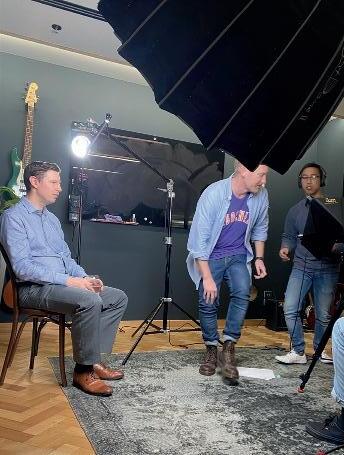
10
The aim of our latest set of videos is to help veterans understand how we will work with them.
NEWS
SGT Henry James Nicholas VC, MM
Henry Nicholas was born in Lincoln, Canterbury on 11 June 1891. He worked as a carpenter before enlisting for World War I.
On 3 December 1917, at Polderhoek, Belgium he rushed ahead of his section and destroyed a German stronghold inflicting heavy casualties. For his bravery he was awarded the Victoria Cross. His Majesty King George V presented Nicholas with the Victoria Cross at Buckingham Palace in July 1918. He was the first soldier from the Canterbury Regiment to be awarded this medal.
Tragically, Nicholas was killed a few months later. For his bravery during his final action at the River Ecaillon near the village of Beaudignies (France) he was posthumously awarded the Military Medal. He was buried with full military honours in the Vertigneul Churchyard, Romeries. His medals are at Canterbury Museum.

Henry Nicholas’ family plot is at the Bromley Cemetery in Christchurch, and it was damaged during the Canterbury earthquakes. Ken Wright, a Korean War veteran, came across the plot and was intrigued to see VC and MM after the soldier’s name. Ken decide to get the grave fixed. When RNZRSA’s national president BJ Clark heard of Ken’s project, he pledged to help the restoration and the RSA-affiliated New Zealand Remembrance Army completed the repair work.
A re-dedication ceremony was held for Nicholas on 23 October 2021. The ceremony was attended by the Minister for Veterans Hon Meka Whaitiri and Head of Veterans’ Affairs, Bernadine Mackenzie.
The Lake Alice Soldiers: an update
Unfortunately a proposed commemoration and unveiling ceremony of the headstones of the Lake Alice Soldiers had to be postponed. The new date (given COVID-19 restrictions) is 5 March 2022.

Barry Rankin and Alan Buckendahl (President, Marton RSA) are organising the commemoration and have engaged with Ngāti Tūmātauenga (the New Zealand Army) and Veterans’ Affairs, with
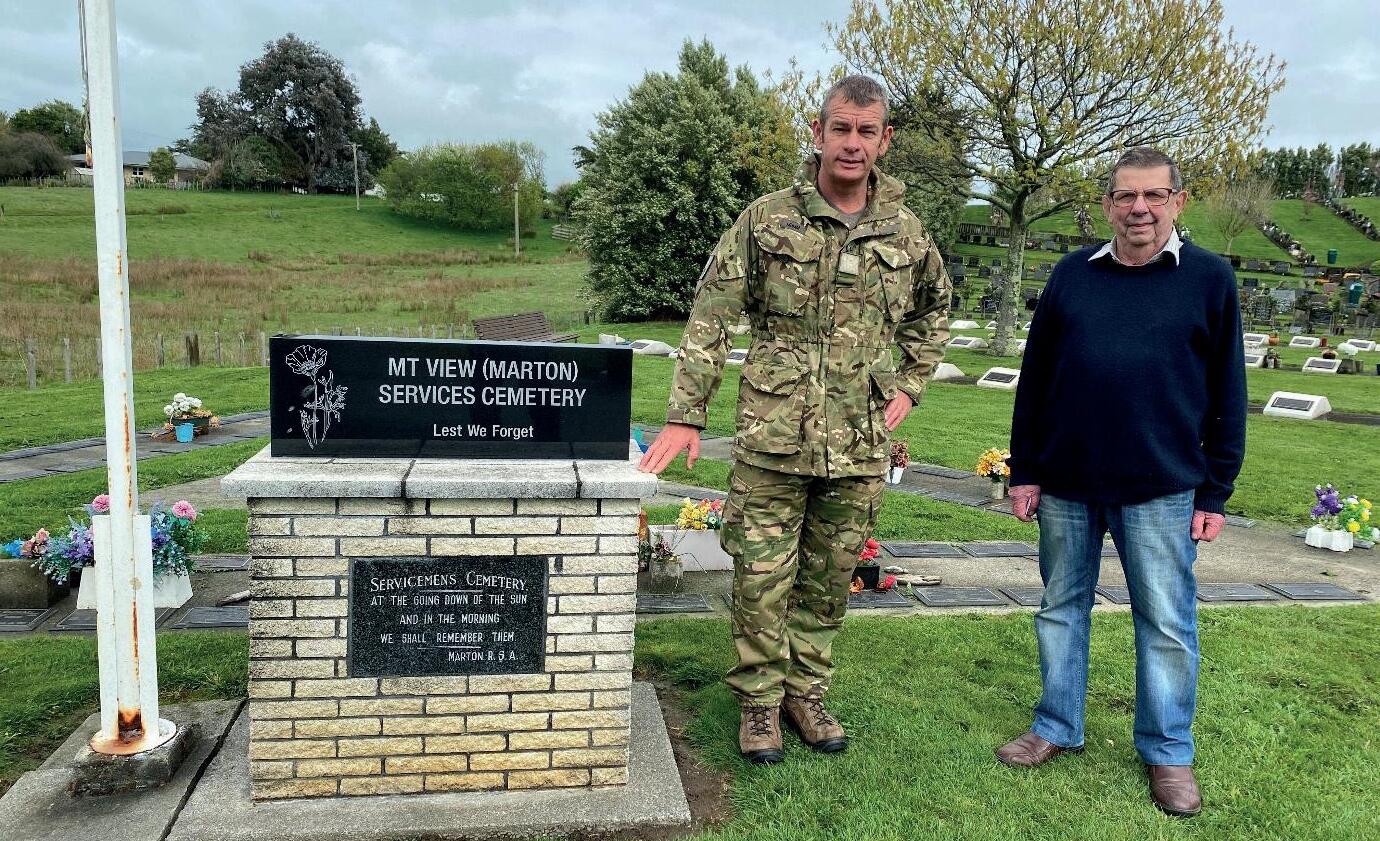
representatives having now visited Mt View Cemetery in preparation for the ceremony.
Barry continues to research the grave sites of the Lake Alice Soldiers. He has now found 31 graves, and many of these will soon have headstones and service plaques. He’s now checking the remaining Lake Alice Hospital records for more service people. Thank you again Barry, for your valuable work and your dedication to honouring these soldiers.
If you would like to know more about the commemoration or would like to attend, please email your contact details to:
veterans.projects@nzdf.mil.nz.
11 visit us online www.veteransaffairs.mil.nz NEWS
Left: WO1 Paul Mumm, RSM 5th/7th Battalion, Royal New Zealand Infantry Regiment and Barry Rankin at Mount View Cemetery, Marton.
Age Concern New Zealand
Age Concern
New Zealand is a charity dedicated to supporting people over 65, their friends, and whānau.
Their Story
The organisation that is now Age Concern was founded on 9 September 1948. Earlier that year, journalist Bud Glasson and Sister Tingey of the District Nursing Service investigated the plight of Dunedin’s old people. The resulting Otago Daily Times exposé stirred public indignation and led to calls for action. Many of the problems faced by older people remain today: hardship, health care, social isolation, and discrimination.
Following a public meeting in September 1948, the Otago Old People’s Welfare Council was established. Later that year a similar council was set-up in Auckland soon to be joined by one Canterbury and another in Wellington.
By the end of the 1960s, there were independent councils throughout New Zealand and national coordination was required. In February 1972, the National Old People’s Welfare Council was incorporated, and that council became Age Concern New Zealand in 1991.
Five years later, the late Dame Augusta Wallace agreed to become the first Patron of Age Concern New Zealand. Dame Augusta was very well known to many New Zealanders including many of our veterans. Her husband was the late Neville Alan Wallace, a Vietnam veteran and after whom the EVSA (Neville Wallace Memorial) Children’s and Grandchildren’s Trust is named.
What Age Concern New Zealand does and why
Everything that Age Concern New Zealand does supports older New Zealanders to live a great later life, to make the choices that best suit them and to have access to services and help they need. They stand up for the rights of older people and against ageism and discrimination.
The core areas of work for Aged Concern New Zealand includes:
• Social connection to combat loneliness and isolation
• Health promotion of nutrition, exercise and driver education
• Elder Abuse and Neglect Prevention
• Advocacy for the rights of older people
At the heart of everything Age Concern does is a passion to see older people experience wellbeing, respect, dignity, and to be included and valued.
Age Concern and our veterans
Many of our veterans are over 65 years of age. Age Concern is located throughout New Zealand, and most local Age Concern have a visiting service (as COVID-19 restrictions allow). They can tell you all about the social activities and services available for older people in your area and we absolutely encourage our veterans and their families to make contact as social connections are so important to personal wellbeing.
For those veterans who have attended one of our veterans’ forums in recent months, you would have seen Age Concern right there alongside us. They’ve proved very popular amongst our older attendees. Veterans’ Affairs very much values the relationship it has with Age Concern as we work together to provide the best support we can for our older clients and their whānau.

Get in touch with Age Concern
Age Concern has a nationwide network of 35 members, branches and associates, each providing services, information and advocacy in response to local needs.
Visit the Age Concern website (ageconcern.org.nz) to find your nearest branch or call Freephone 0800 65 2 105 to get in touch.
12
NEWS
Budgeting and planning in retirement
By Mark Williamson, NZDF Benefits Manager
spending in retirement. The latest figures published in May 2021 show that a two person household living in the three largest cities spend an average of $1,423 per week. By contrast, living in a smaller city or town is cheaper by approx. $300 p/w1
An alternative option is to take your pre retirement budget and multiply by 75% or ¾. This model assumes that in retirement you will spend approx. 75% of your pre retirement budget. Another and more precise option is to develop a retirement household budget using Excel or one of the great budgeting tools available on the Sorted website (NZ Retirement Commission).
If you have any queries or comments please email us benefits@nzdf.mil.nz we would love to hear from you.
Force Financial Hub –Google search ‘Force Financial Hub’ NZ Retirement Commission –sorted.org.nz

Milestone Direct Ltd –phone 0508 645 378 or email info@ milestonedirect.co.nz
Disclaimer
This article contains general information service provided by HQ NZDF. Because the information is general in nature, it may not be relevant to individual circumstances. Before making any investment, insurance or financial planning decisions, you should consult a professional adviser
Just how much we spend in retirement is determined by a variety of factors, such as where we retire, whether we are still paying a mortgage or rent, the makeup of the household (e.g a couple or a single retiree), whether there are grandchildren, hobbies and the likelihood of travel. Some of us may also like dining out or other treats, in which case retirement may be more expensive.
The key thing is that we are all different and so projected retirement expenditure will vary from household to household.
What we do know is that we don’t stop spending money as we get older, we just spend money differently.
This is why a retirement budget is very important.
There are no hard and fast ways for working out how much we will spend in retirement. Massey University helpfully interview a cross section of NZ retirees each year to work out what the average retirees are
In addition to having a retirement budget, you may also find it useful to have a financial plan developed for you by a registered financial adviser. Your investments may need to last 25 to 30 years in retirement and the financial plan guides you on where to place your investments and how much you may need to draw down each year to supplement national superannuation or veterans payments. The financial adviser may also make investment decisions on your behalf if authorised to do so.
Veterans are able to obtain a financial plan from Milestone Direct Ltd (NZDF’s preferred financial advice service) at a discounted price.
To find out more about retirement planning and budgeting go to the Force Financial Hub or Sorted sites. The Force Financial Hub lists all the benefits available to Veterans and also includes a series of webinars on retirement and investments.
The material published in this article is general in nature and is not intended, nor capable of being, personalised financial advice or advice on any specific problem or situation.
Earlier payments over Christmas and New Year
Due to the public holidays, veteran payments scheduled for Tuesday 4 January will be paid earlier. Those revised payment dates are:
• For New Zealand, Australian and Cook Island veterans you will be paid at the early date of Friday 31 December 2021
• All other international bank accounts will be paid on Thursday 30 December 2021. All other scheduled payments over the Christmas and New Year period will be paid as per usual.
13 visit us online www.veteransaffairs.mil.nz
You may be already retired. Or, like me you may be in your early 60s and starting to contemplate what retirement may look like and how much you will be spending each week once retired. And just as importantly, how much will be required in investments to provide a comfortable retirement.
1 Source – Massey University NZ Fin Ed Centre – Expenditure Guidelines May 2021.
NEWS
Year in review
As we approach the end of a difficult year for many Kiwis, we reflect on a year that marked some important moments for Aotearoa/New Zealand. Amongst the various lockdowns and alert levels associated with COVID-19, Veterans’ Affairs managed to meet with and support veterans and their family and whānau in Whangārei, Gisborne and Hamilton. We were also able to provide opportunities for veterans to learn new skills at the Taratahi Agricultural Training Centre. A difficult, but fulfilling year.

The beginning of the year marked 30 years since coalition forces launched Operation Desert Storm in 1991, the coalition defence of Kuwait. New Zealand Defence force personnel were part of the 35 member coalition that was led by the United States. Veterans’ Affairs in partnership with the Ministry for Primary Industries and UCOL ran three courses for veterans at the Taratahi Agricultural Training Centre, in the Wairarapa. A total of 25 veterans attended courses in March, April and June, where they lived-in at Taratahi to learn basic farming skills. Skills that might be the basis for a new career or for use on their own land.
Our very own Brett Te Wheoro, Veterans’ Affairs staff member and Afghanistan and East Timor veteran was again on the front line as he was deployed in his reservist role to manage MIQ teams in February and then again in September.

On 19 March at Pukeahu National War Memorial Park, 26 Jayforce veterans, most in their 90s, were joined by Her Excellency The (then) Governor-General of New Zealand, Dame Patsy Reddy, His Excellency Mr Ito Koichi Ambassador of Japan to New Zealand, and other diplomatic representatives to mark 75 years since the arrival of Jayforce in Japan.

14
OUR YEAR
In between COVID-19 lockdowns and alert levels we met with our veterans in Whangārei, Tairāwhiti/Gisborne and in Kirikiriroa/Hamilton, with all regions turning on spectacular weather for all attendees. Our forums are about veterans connecting with Veterans’ Affairs, with support organisations and most importantly with each other.
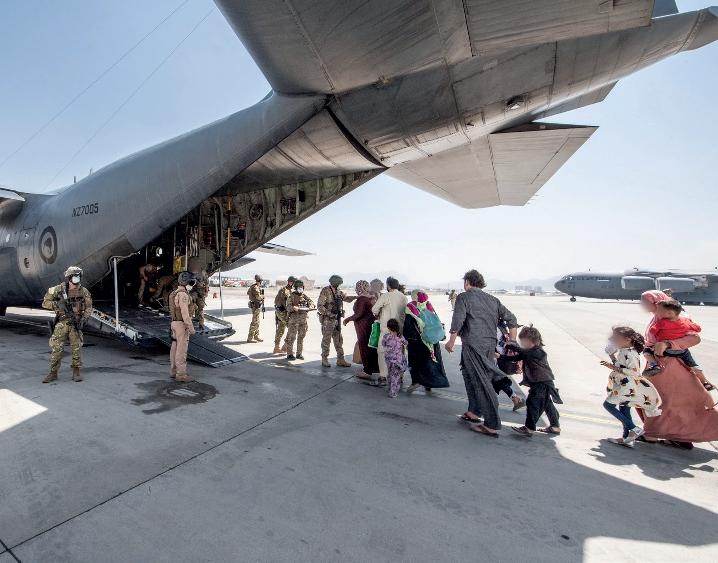
Veteran Don McLay took part in the Intro to Farming course run by MPI, AUT, and Veterans’ Affairs. This week long course at Taratahi Agriculture College in Masterton included introductions to: fencing, Quads, ATVs and using heavy machinery, milking, working with sheep and cattle, but it was the beekeeping that piqued Don’s interest.

Don and 4 others from the Taratahi course attended another two-week course on beekeeping. So taken with beekeeping that Don and a friend, also from the course, purchased 14 hives. Don hasn’t got a new career just yet, but he’s found a new passion.



15 visit us online www.veteransaffairs.mil.nz
OUR YEAR
Message from the Governor-General
Kia ora koutou
As Governor-General and New Zealand’s Commander-inChief, I send my warmest greetings to veterans of our nation’s armed services, wherever you may be. I hope you are keeping safe and well, in these uncertain times.
After I was sworn in as GovernorGeneral on 21 October, my first act was to visit Pukeahu National War Memorial, where I placed a wreath on the Tomb of the Unknown Warrior. I reflected on the times in our history when war dominated the lives of our citizens, as well as the enormous impact of military life on the lives of the more than 420,000 New Zealanders who have served in our armed forces.
Our veterans have played a significant role in our nation’s story and in the development of our relationships around the world –and I can vouch for that enduring international legacy from personal experience. Some years ago, my work took me to Crete and I met with the warmest of welcomes – and all because I was a New Zealander. I saw for myself how the people of Crete have never forgotten the New Zealand soldiers who came to their aid in 1941. They are so grateful that brave men from the other side of the world would stand beside them in their hour of need.
It’s a strength of comradeship evoked by this whakatauki:
Ehara taku toa, te toa takitahi, engari he toa takitini
My strength is not as an individual, but as a collective.
I cannot draw on personal experience of military comradeship. Nor can I ever fully appreciate the lingering effects of time on the battlefield, peace-keeping duties in war-torn
countries, or humanitarian responses to natural disasters – here and overseas.
However, if there is a common thread to my career to date, it has been a quest to build the resilience and wellbeing of our communities – a quest that will underpin my term as Governor-General. I will continue to work with organisations committed to strengthening the mana and wellbeing of New Zealanders. Veterans’ organisations will be part of that mahi.
In addition, it will be my great privilege to join veterans at commemorative events, including on Anzac Day. I look forward to meeting you, learning about your experiences, and thanking you – on behalf of all New Zealanders – for your service to our nation.
The Rt Hon Dame Cindy Kiro, GNZM, QSO
Governor-General of New Zealand
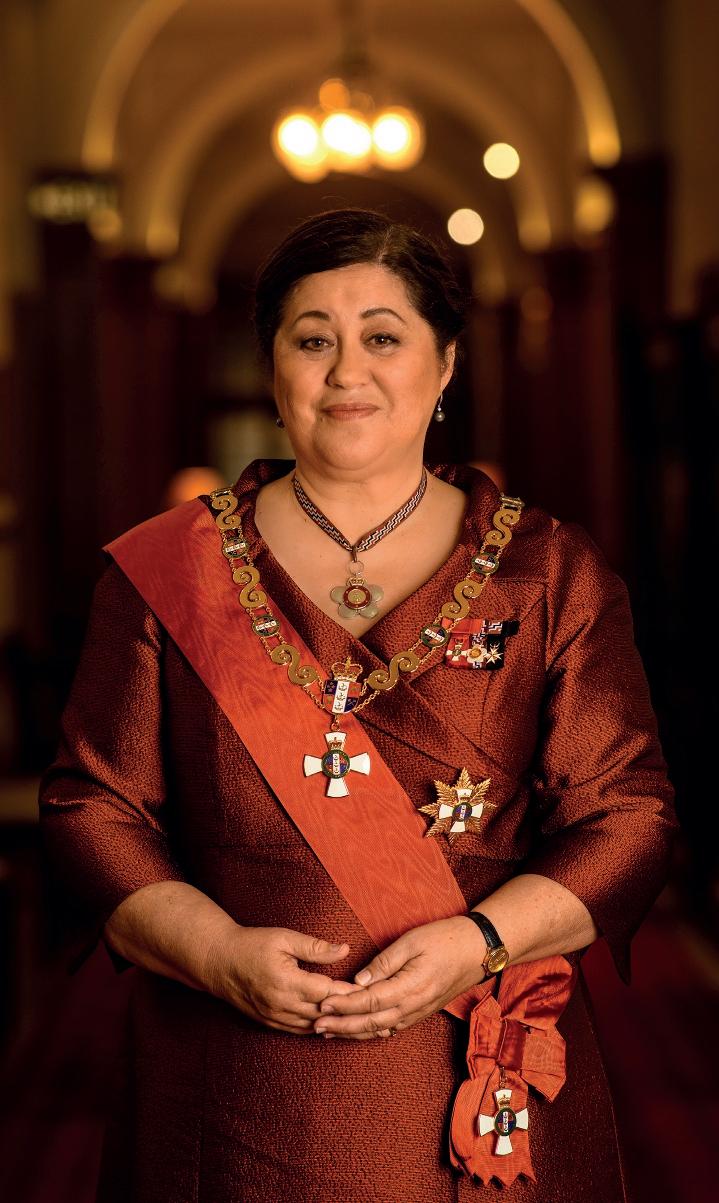
16
OUR PEOPLE
































